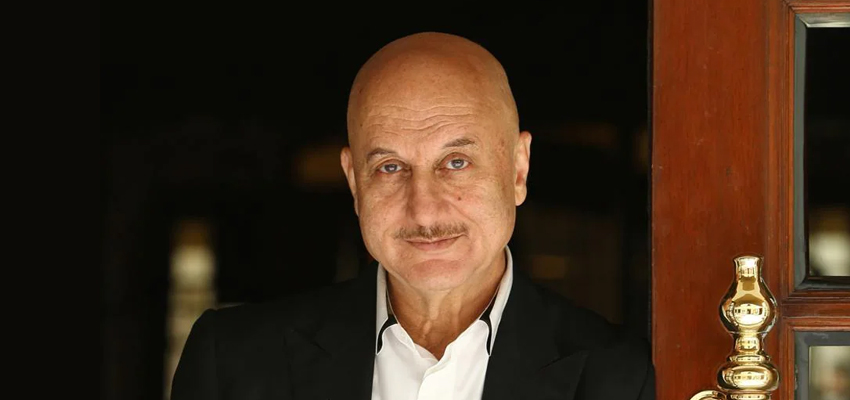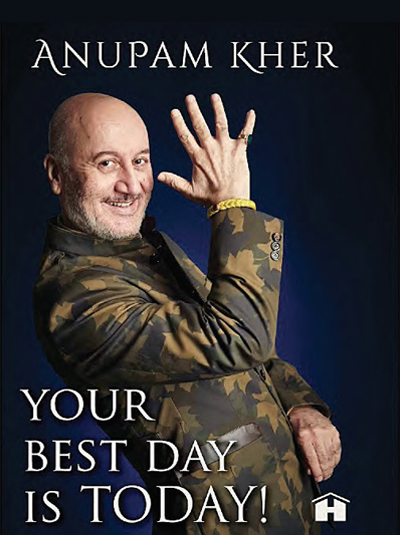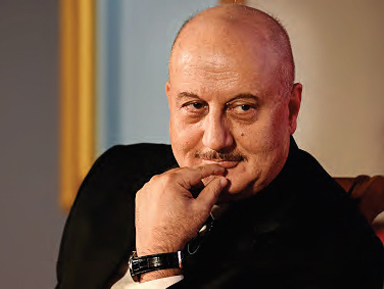‘I’m an eternal peddler of hope’

Award-winning international actor, author, and motivational speaker, Anupam Kher’s latest book, “Your Best Day Is Today” is an enduring narrative that encourages us to take a pause, consider and appreciate the smaller things in life. An amalgamation of experiences, lessons and positive takeaways, the book attempts to present a guide to connect with your inner self in order to cope with these difficult times. In conversation with Sanjoy K Roy, an entrepreneur of the arts and Managing Director of Teamwork Arts, at the 14th Jaipur Literature Festival, Kher delves deep into the importance of adapting to change and the necessity of knowing that you are not alone. Excerpts from the interview
"When my mother was detected Covid positive and had to be hospitalised, it was the most difficult thing for me to leave her near the isolation ward. My mother generally feels that her son is Anupam Kher, he can do anything… now she had to be on her own. The most amazing thing was how we should believe in the compassion of others"
Sanjoy K Roy: Your new book is empathetic, sensitive and perhaps reflective, with a touch of sadness. Tell us a little about rediscovering Bittu.
Anupam Kher: Bittu is my ‘ghar ka name’; I was born in Shimla and everybody has a nickname. Bittu grew up in a family of 14 people, Bittu’s father was a clerk in the forest department who earned Rs.90 and we had to manage within that for the month. Because of the small town and poor family background, Bittu used to dream a lot… about one day becoming popular, well-known. Bittu was not good at studies at all; never scored more than 38% marks in his studies in his life. He was not a great sportsperson either; in fact, one day he was running and his PT teacher told him, ‘Even if you run alone, you will come second’. As a child, I, as Bittu, always wanted things to become better. And yet we were very happy; we did not realise that we were poor, so much so that one day I asked my grandfather how we were so happy despite being poor. My Dadaji replied, ‘When you are very poor, the cheapest luxury available is happiness’. So, Bittu grew up with his warm crazy family of cousins, tayajis etc. Listening to stories from the Ramayan and Mahabharat, old tales, grandmother singing a lullaby. And Bittu has a great sense of wonder about life.
Anupam Kher carries the burden of being Anupam Kher. Bittu is the one who reminds Anupam Kher to go back to the beginnings, which is where the joy and charm starts. Every time I feel elated, my happiness doubles when I think where I started from. Here’s a picture of Bittu’s ID card, at age 15, when he joined the NCC. I keep this in my office at hand. Every time I start feeling I’m the most happening person on earth, I look at this. The other picture I have here is of me receiving the Padma Bhushan and next to it, is Bittu’s picture. Behind the frame is written-‘Kuch bhi ho sakta hai’. Never have I let Bittu disappear in my life. He is my reference point to reality, to making myself more happy, more joyous. Bittu reminds Anupam that he came with Rs.37 to Mumbai in 1981, and that today he is doing much better. Bittu is my coach, my psychiatrist and my reality.
Those dreams of Bittu, fast-forward four decades to New York, where you write about feeling the chill of the city as Christmas approaches.
I had never heard the word pandemic in my life, nor lockdown-yes, I had heard of lockup. I called up Herman, my manager, and said there was a conversation about some virus happening etc. He advised me to come back as some flights had already stopped. I was also shooting for New Amsterdam. I could feel the stress when we were shooting at Kings County Hospital Center in Brooklyn. Finally, my friend Anil Kapoor said, ‘You have to come back because the day after is the last flight’. That is the day I picked up my luggage, it was 20 March, 2020, and caught the second last flight of Air India from Newark to Mumbai. The streets of the city felt like a Will Smith film called I Am Legend in which he is the only person who is surviving. And the fear got into me. I’m a person who looks for silver linings in the darkest clouds because that is how you have been brought up. I started looking for some kind of sign to believe again in the possibility of goodness, of positivity… and for the first time in 39 years that I’ve been in Mumbai, I heard birds chirping. I had never heard the cooing of a koel-either I had been too busy or the birdsong was hidden by the noise of the city. Stepping into my balcony, I started cooing in response to the koels, interacting with them. And then I looked up and noticed to my surprise that for the first time the sky was a little blue in Mumbai. I had found my silver lining. This is how the beginning of the pandemic started for me.
When my mother was detected Covid positive and had to be hospitalised, it was the most difficult thing for me to leave her near the isolation ward. My mother generally feels that her son is Anupam Kher, he can do anything… now she had to be on her own. The most amazing thing was how we should believe in the compassion of others. That’s why I’m an eternal peddler of hope. I believe that hope is always around us; hope means life. I would sit in the hospital lobby, my face masked, head covered with a cap, and this lady who had come to see her husband, approached me to say, ‘Anupamji, don’t worry. Your mother will be well’. Her husband was seriously ill. When you see the compassion of this kind, you believe things will become alright.
"My grandfather used to say when you understand the life you become sad. I used to always wonder why he said that. The more I understood life because of the pause that I took because of the quietness we encountered, the more I understood the other person’s point of view. It made me a better person"

What is our responsibility in this scenario?
In a situation like this, information is most important, followed by compassion and giving hope. The patient as well as the family suddenly became an outsider to the world. That is what sparked off the book; I am not a professional writer; I only write when I need to communicate something.
If Covid-19 has to go anyplace, we have to do it together. Why is it our duty to intervene?
One day, I noticed some construction happening in the parking lot of a person near my house. The gentleman was safe in his house at the top issuing instructions to the 5-6 poor workers down below. I tried ignoring it initially, but eventually, I couldn’t keep quiet and asked him ‘Aapko duty samajh mein aata hain?’ His logic was, ‘Chhutti hai, so it’s a good time to get the work done’. Sometimes you have to speak about it, even at the risk of being unpopular. We want to be the civilised lot who does not interfere in other people’s matters…no. I think sometimes it’s important to interfere when it comes to matters of duty and responsibility. My heart used to go out to the BMC workers in their PPE kits and masks, collecting the waste every morning. Every day I’d have a chat with them and salute them.
In fact, your book opens with a tribute to frontline workers. Moving on, you have always been a restless soul, doing different things. And then the pandemic brought you into a different space. Tell us a little about what happened to you in this lockdown period, and that resulting in the book.
I have never taken an off in the past 36 years. You will never read anywhere that Anupam Kher is lazing on the beaches of Maldives. That gave me a name of being a restless soul, among my friends. But my restlessness has been very productive. The fact that I have been able to write three books, run the acting school, the fact that I have done 518 films. For me, restlessness has always been an asset. And then suddenly I had nothing to do. I discovered that I had 12 tiles on my roof, I have 11 windows in my house, I have different plants outside my balcony, these are the names of my domestic help-Guddu, Madan, etc, whose father lives in Uttarakhand… And then I realised how distant I had become from life. How we are all running fast…nowhere. I also understood the importance of a pause.
As an actor I have always understood the importance of pause-Mr Alkazi, my teacher, used to say ‘This is a pause, this is a pregnant pause’. Now there was a pause happening in my life and then I discovered my own breathing. To me, meditation is noticing your breath, your breathing. That made me more restless initially when I was becoming calm because all these things become your habit, right? That’s when I started making videos of Bittu and Anupam Kher, because there was a constant conflict happening-the calmer I was, the more Bittu I was; the more restless I was, the more Anupam Kher I was. I showed Bittu making fun of Anupam Kher.
You also spoke about how important it is to reconnect with your friends from the past.
I had a black and white photograph of my 10th-grade classmates. I pulled out that picture, there are around 57 boys in that picture, and I called up at least 30-35 of those boys. It was so wonderful to speak to them… When you’re in school you take the full name-Vijay Pruthi, Vijay Sehgal, Satish Malhotra, Anil Datta, who used to come first in my class. After the initial shock of receiving a call from Anupam Kher, I think I spread happiness in their life but also we went back to ‘Woh yaad hai woh Ramlal teacher dande maarta tha?’ These are the joys we had forgotten.
In your book, there is a tinge of sadness, of loneliness…
My grandfather used to say when you understand the life you become sad. I used to always wonder why he said that. The more I understood life because of the pause that I took because of the quietness we encountered, the more I understood the other person’s point of view. It made me a better person. And the more you understand life, the more melancholic, and sad you become. Sadness is a part of creativity. I was reading somewhere that Japan now has a Minister of Loneliness. Sadness comes with wisdom. Thank you, indeed it does.
YOUR BEST DAY IS TODAY: WHAT’S IT ABOUT?
In his new book, 'Your Best Day Is Today', Anupam Kher recounts his experiences during the lockdown, several ups and downs, including the time when his mother Dulari and brother Raju Kher had contracted the coronavirus. The book is a compendium of experiences, lessons, and positive takeaways to help deal with the dark times in your life. It is a guide to getting in touch with your inner self and finding solutions to the problems that arise with adapting to changes in life. It is also a reminder of how you are not alone and there is always a way to make the best of any situation life throws at you.
LIFE LEARNINGS

It’s important to tell people, who you take for granted, what you feel for them-not use an emoji on a mobile phone. You have to pick up the phone and say ‘I miss you. Are you fine?’ We take love for granted with certain people; we are busy telling new people what we think of them.
Our mind plays games with us. We always believe there is a 50% chance of something not happening. My grandfather used to say, don’t go through a problem twice-once by thinking about it and again by going through it. Earlier, I was walking fast nowhere; now I will walk slowly somewhere. I have cut down on my speed and it has nothing to do with my physicality or age. I am calm because I don’t lie to myself. I might lie to people sometimes to avoid unpleasantness but I am very honest with myself. I am calm because I follow my grandfather’s formula: delay your response by three seconds and your response will change.
It’s fantastic to be ambitious, a go-getter but everybody is born with a personality-how you are comfortable with yourself. If you let go off that personality you are neither yourself nor the person you are wanting to be. Your fingerprints don’t match with any other person’s fingerprints in the world-that means you are special. We let go off our speciality in our pursuit of wanting to be somebody else.
How can you fulfil your goals if you don’t dream? You have to start with a dream and then follow it up with honesty and hard work. Dreaming signifies optimism, possibility, hope… It’s very important to love yourself, love your life, and tell people what all you have done to reach where you have reached.
Bittu does not believe in regrets; Bittu loves life! Fantastic things have always happened in Bittu’s life. Bittu used to stammer; today, he teaches speech in his acting school. It’s important not to let go off the child you were; if he or she is with you, you will have fun.